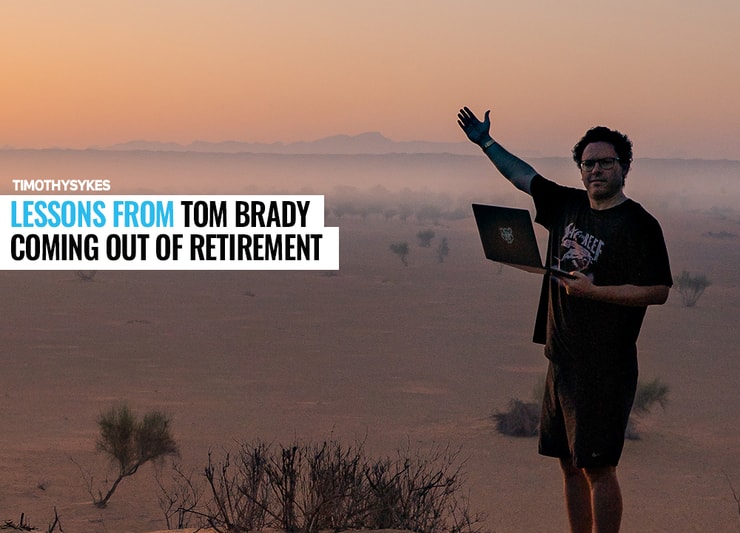On Sunday, after 40 days of wandering in the desert of retirement, seven-time Super Bowl champion Tom Brady announced his comeback…

As Brady tweeted, “These past two months I’ve realized my place is still on the field and not in the stands.”
What does that have to do with trading penny stocks?
It all comes down to mindset. It’s just as important as your training. You’ve probably heard me say it before. But this is a perfect time to reiterate…
Trade Like a Retired Trader

Tom Brady is no different than many aging sports stars. The last sentence in his tweet says, “Unfinished business LFG.”
He misses the limelight. Deep down, he knows that most retired sports stars become irrelevant. Especially if they feel like there’s unfinished business.
In other words, it doesn’t matter that he’s 44 and this will be his 23rd season … He’s pissed off that he didn’t get the Bucs to the Super Bowl again. The GOAT wants an eighth ring and he’s leading one of the top teams in the league.
I understand that mentality because that’s exactly what I try to do with trading.
I filmed this a few weeks ago, but it’s relevant now since Tom Brady just ended his NFL retirement & this lesson has helped me SO MUCH over the years as even though I’m a full-time trader, I use this mind trick to help me stay more patient and wait for the best plays! #retirement pic.twitter.com/zRagwfVo85
— Timothy Sykes (@timothysykes) March 14, 2022
It’s counterintuitive, but I think of myself as a retired trader. I don’t need to trade. But if a trade comes along that pulls me out of retirement, I have to take that trade.
Why?
Because I would feel guilty NOT taking it.
Again, it’s counterintuitive. Why wouldn’t I want to take a trade?
Because, if you actively look to trade, you end up forcing things. You focus on the wrong setups — or worse, random setups. And that leads to random results.
Let me put it another way. If the Bucs had a terrible last season, Tom Brady might not be willing to come back. But they didn’t. They went 13–4, won the NFC South, and made it to the divisional round of the playoffs.
He couldn’t pass up the opportunity to come back, with his team intact, and give it another shot. And I don’t blame him.
That’s how I trade…
Think Like a Retired Trader

It’s OK to stop your life if there’s a good trade. It’s fine to put things aside when a setup comes along…
But that setup is so good…
… you’d feel guilty for NOT taking the trade.
But don’t be confused — this doesn’t mean I’m going for home runs. It means that I’m willing to wait for opportunities that best fit my go-to strategies.
For instance, even though energy plays have been running lately, I haven’t traded a ton of them. I refuse to chase, especially when so many stocks are so overextended.
But a few weeks ago, I saw an opportunity in Smart Sand Inc. (NASDAQ: SND). It wasn’t overextended like so many of the other energy plays, and I saw an opportunity for my Weekend Trader pattern.
I bought it on Friday afternoon. On Monday morning, energy plays all opened up nicely — and I got out of the trade with a nice little $1,464 win.
Wanna see how I’m trading energy plays right now? Don’t miss this:
More Breaking News
- Archer Aviation’s Shimmering Ascent: Is Now the Time to Soar With This Stock?
- TeraWulf’s Recent Plummet: Opportunity or Warning Sign?
- Richtech Robotics Makes a Splash at CES 2025: Market Implications Explored
Do You Understand the ‘Retired Trader’ Mindset?
Acting like a retired trader is NOT the same as being lazy.
It means you’re patient enough to sit on the sidelines and wait until the best plays come along.
And while you wait, you prepare. Study the past. Look at my trades (they’re all posted publicly here). Practice by paper trading. Be ready to jump out of retirement and trade like a sniper at a moment’s notice.
This mindset is the result of years of practice and studying. Are you ready to invest in your ‘knowledge account’ so you can be prepared to take advantage of the trading opportunities out there? Apply for my Trading Challenge today.
Do you understand what I’m saying and why I posted this video? Leave a comment below and say, “I WILL NOT CHASE” if you get it!


Leave a reply